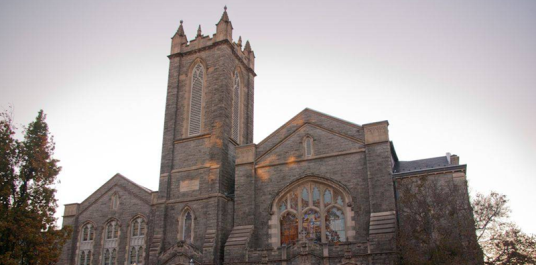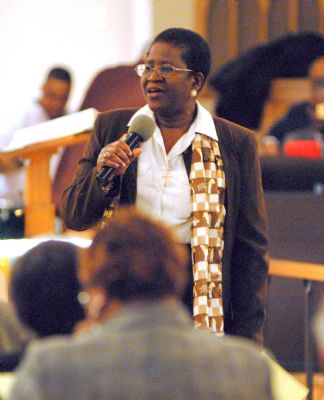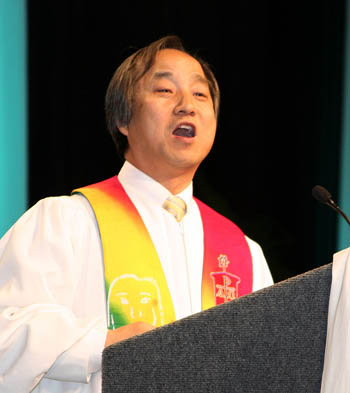by Matthew Hamilton
 Foundry United Methodist Church, DC (Photo credit dc.about.com)
Foundry United Methodist Church, DC (Photo credit dc.about.com)
Prominent Foundry United Methodist Church in Washington, D.C. continues to promote its liberal vision of politics and philosophy with its two most recent visiting preachers: Rev. Gennifer Brooks of United Methodism’s Garrett-Evangelical Theological Seminary, and United Methodist Bishop Hee-Soo Jung from Chicago.

Rev. Gennifer Brooks (Photo credit umc.org)
Brooks’ sermon two weeks ago titled: It’s not Radical, It’s Just Christian, began with criticizing how many United Methodists have misused “radical hospitality,” the practice of trying to bring as many people into a congregation as possible.
“They missed the mark cause when their focus was on numbers, on getting people into the church, what they were missing was the whole idea of Christian living, holy life… while they were trying to get numbers they did not tell folk that they need to change their ways. Worse than that, they didn’t tell them how hard it was, it is hard to be a Christian.”
Well it’s certainly refreshing to hear that herding people into a church without any discipleship isn’t the best idea. Brooks continues: “Worse than that, they didn’t tell them how hard it was, it is hard to be a Christian.” So far, so good, but why is it hard to be a Christian?
“It’s hard because in our lives we want to hold onto the things we know and we don’t want to do any differently.”
Oh that’s why. I always thought it had something to do with having a sinful nature, silly me.
Going back to the idea of radical hospitality, Brooks asserts “true hospitality is openness to new ideas.” Whereupon she laments that America is “a nation where we seem to be going backwards as far as openness to folk, openness to ideas.”
Brooks then denounces U.S. immigration policy and Republican attempts to limit unemployment benefits as examples of backwardness. After these political attacks, Brooks laments that “many of us are living the life of a post-Christian. Christ does not have a predominant place in our lives.”
Maybe that’s because Christ has been replaced with liberal political activism?
 Bishop Hee-Soo Jung (Photo credit flumc.org)
Bishop Hee-Soo Jung (Photo credit flumc.org)
Bishop Hee-Soo Jung gave his sermon, Nice is Not Enough, to Foundry UMC only last week. He didn’t even wait to get past his own introduction before bringing politics to the pulpit:
“I’m neither a fundamentalist nor a supporter of the religious right. As a Korean, I love tea and a good tea ceremony, but the “Tea Party” is not my thing!”
Bishop Jung then talked about what he calls “the faith of Jesus:”
“Faith modeled upon the faith of Jesus places his life and teachings at its center. The faith of Jesus emphasizes love of God and neighbor and responds to Jesus call to ‘Follow Me!’ The difference is between being some sort of “believer in Jesus,” and becoming a “follower of Jesus.”
Jung calls the “believers in Jesus” people who have faith in the death and resurrection of Jesus and believe that Biblical doctrines are essential to being saved or face Hell. He continues:
“Those who claim the ‘faith of Jesus’ see him accepting and affirming every human as already a member of God’s family and feel compelled to do the same. His life and ministry was one of accepting and affirming all those that his religious peers were excluding. For Jesus, there was no question as to ‘who was in’ and ‘who was out’ with God. All were in!”
Kumbaya right? Well not really. In the first place, every human is not automatically a member of God’s family per Luke 8:21: “He (Jesus) replied, ‘My mother and brothers are those who hear God’s word and put it into practice.’”
As to the “All were in!” assertion by Jung, Jesus says in Matthew 13:49-51: “This is how it will be at the end of the age. The angels will come and separate the wicked from the righteous and throw them into the blazing furnace, where there will be weeping and gnashing of teeth.”
“Have you understood all these things?” Jesus asked. “No,” Bishop Jung seemingly replied.
On second thought, I suppose everyone is “in.” Some people, according to Jesus, just happen to be in a blazing furnace where there is weeping and gnashing of teeth. Kumbaya.
And Jung did not stop there. Speaking of the time during his youthful, enthusiastic conversion to Christianity, Jung makes this extraordinary statement:
“I refused to see that the Buddha shared a great deal with the Christ who[m] I had come to serve, and that the Buddha was a friend of Jesus.”
The troubling implications of mixing Christianity and Eastern philosophy are too numerous to mention here. It should be sufficient to simply point out that a United Methodist Bishop following two religions is contrary to Jesus’s own words that “No one can serve two masters” (Matthew 6:24).




Comment by Gabe on July 24, 2012 at 12:17 am
One of the best books that I have ever read was “The Lotus and the Cross: Jesus talks with Buddha” by Ravi Zacharias. It simply and quickly laid out how truly different the Christian faith and Buddhist faith are. A great read.
Comment by Dan on July 24, 2012 at 12:21 pm
Ah, what a witches brew of universalism and salvation through social justice the UMC has become! The ecclesiastical leaders are so very busy being inclusive and forcing people to behave in accordance with their vision of heaven on earth, implemented via the heavy hand of government law and presidential edicts. I cannot remember the last time, or if ever, that I heard a sermon in a UMC that covered original sin, Christ’s substitutionary atonement, or the necessary and full sufficiency of God’s saving grace. While all the clergy are working so hard at “going on to perfection,” in their quest for social holiness, the world is lterally going to Hell.
Comment by Fede on August 13, 2012 at 5:40 am
As odd as this seems I actually digearse with Jones on all three points. Liberal and Progressive are both thoroughly theological terms and everyone from Carol Howard-Merritt to Austin Roberts has been trying to tell me that Evangelical is a sociological distinction and not inherently theological. ( I still hold out hope)
Comment by jaltman81 on August 2, 2012 at 1:04 pm
Out of all the things one might do with his time, why does Mr. Hamilton consider trolling around other people ‘s sermons for signs of “heresy ” a wise or faithful use of his?
Comment by Praveen on August 13, 2012 at 5:18 am
The non-Christians I know typically have great rcespet for Jesus of Nazareth- they just don’t accept him as the Messiah. As a Christian, I do believe they’re missing the most important part of His teachings, but the best way I know to share the Gospel is by trying my hardest to live by the example He set. It’s my responsibility to let God’s love for the world embodied in Christ’s great sacrifice reflect through my words and actions.
Comment by Ed Soders on January 10, 2013 at 1:47 am
i always believe that buddhism is sort of the religion of peace compared to other religions. buddhism speaks of peace all the time.-